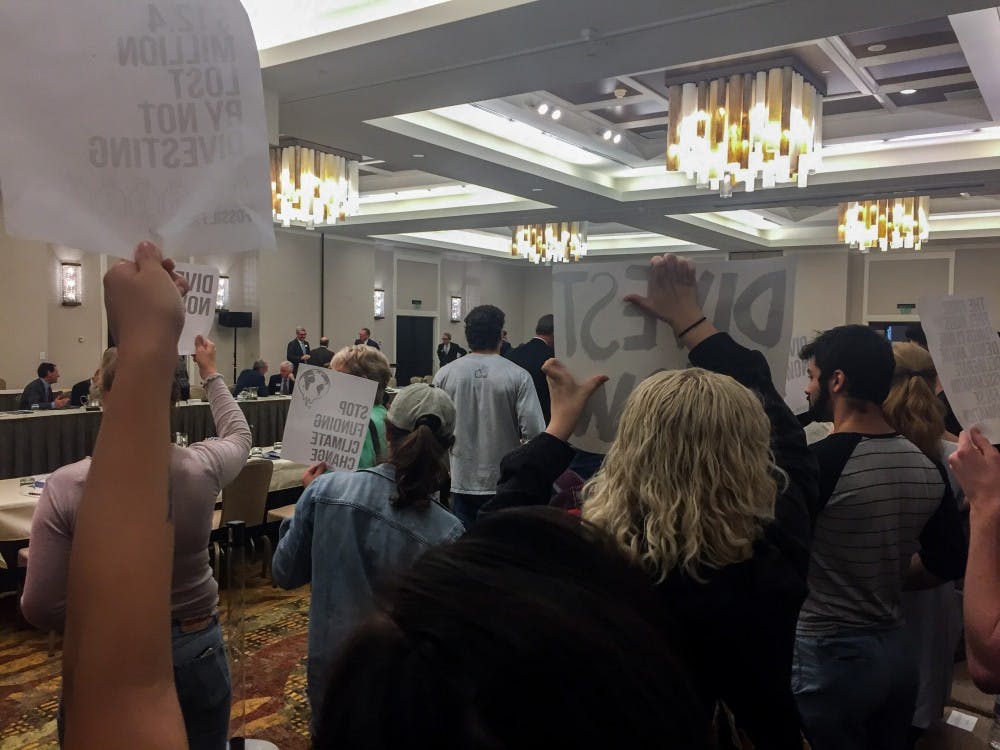
A group of over 60 students chanted, “Hey, hey, Amy G., make Penn fossil free,” as they marched from the Button sculpture outside Van Pelt Library to the University Board of Trustees meeting at the Inn at Penn on Nov. 3.
Fossil Free Penn, the student group that advocates for Penn to divest from fossil fuels, staged a silent protest of the Friday morning meeting as a culmination of its public demonstration, Divestfest, on College Green earlier this week.
This is the second time FFP has staged a silent protest of a Board of Trustees meeting this semester. On Sept. 28, seven FFP student protesters held up printouts as they stood across from administrators at a Board of Trustees Executive Committee meeting. However, the meeting on Friday was larger in scope and included all members of the board.
FFP Outreach Coordinator and College sophomore Jacob Hershman said the increase in student protesters may be due to the group’s new tactics in engaging the student body.
“The majority of people who participated today I have never seen,” Hershman said, adding that Divestfest brought a lot of attention from outside student groups. “I haven’t seen [many of these people] in activist circles involved in protests in the past, so [it's] definitely a success.”

The protest on Friday lasted about one and a half hours. The group, armed with 8.5 x 11 inch computer printouts, started chanting and marching 30 minutes before the annual fall Board of Trustees meeting began and continued to do so throughout the hour-long meeting.
Once the group arrived at the Inn at Penn, the silent protesters were prompted to write their names and schools on a registration sheet before entering the conference room.
Similar to the silent protest in September, the demonstrators were not acknowledged by trustees throughout the meeting, despite filling every open seat in the room and the standing area along the walls.
During an opening statement, University Chaplain Rev. Chaz Howard described Penn as “an institution that rises to the challenge that faces our world," prompting a brief period of laughter among the student protesters. But throughout the rest of the meeting, the group was silent.
FFP Campaign Co-coordinator and College junior Zach Rissman said prior to the meeting, the group spoke for a week to Associate Vice Provost for Student Affairs Hikaru Kozuma, who instructed the group on how to follow University protocols during the demonstrations.
FFP followed Kozuma's suggestions, which included limiting Divestfest to three days, instead of the original plan of protesting on College Green for six days. FFP also followed Kozuma's suggestion of lowering signs and sitting down while the board recognized the trustees who died during the past year.
After the sit-in in November 2016, Rissman and two other members of the group met with Kozuma every month until FFP's spring protest. The group began conversations again last week in preparation for this week's demonstrations.
And despite the board's failure to acknowledge their presence, members of FFP said they considered the event a success.
“Today was an ultimate testament to the fact that the students here care and are watching what the trustees do,” College and Wharton sophomore and FFP member Megan Kyne said. “What they’re doing is hypocritical, immoral, and not logical as an educational institution.”
Rissman agreed, adding that the group had an “overwhelming student presence” and filled up all the available seats for viewers.
After the meeting, a few trustees told the group they appreciated their efforts, which Rissman echoed when inviting the remaining protesters to attend the weekly FFP meetings saying, “The fight goes on.”
“I think we shouldn’t discredit that there are great innovative things happening here,” Kyne said. “But for every dollar that they spend on research and innovation, it’s discounted by the fact that they’re also funding millions of dollars in the fossil fuel industry.”
The Daily Pennsylvanian is an independent, student-run newspaper. Please consider making a donation to support the coverage that shapes the University. Your generosity ensures a future of strong journalism at Penn.
Donate







